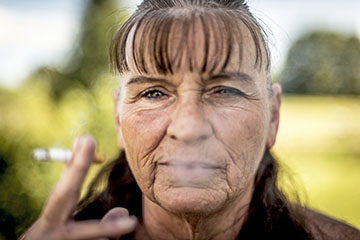MARTINSVILLE, Va.— After decades of lawsuits, public campaigns and painful struggles, Americans have finally done what once seemed impossible: Most of the country has quit smoking, saving millions of lives and leading to massive reductions in cancer.
That is, unless those Americans are poor, uneducated or live in a rural area.
Hidden among the steady declines in recent years is the stark reality that cigarettes are becoming a habit of the poor. The national smoking rate has fallen to historic lows, with just 15 percent of adults still smoking. But the socioeconomic gap has never been bigger.
Among the nation’s less- educated people – those with a high-school-equivalency diploma – the smoking rate remains more than 40 percent, according to the Centers for Disease Control and Prevention. Today, rural residents are diagnosed with lung cancer at rates 18 to 20 percent above those of city dwellers. By nearly every statistical measure, researchers say, America’s lower class now smokes more and dies more from cigarettes than other Americans.

Debbie Seals of Martinsville, Va., a smoking-cessation expert in an area where factories have shut down, says poor people smoke because “it’s the one thing they have control over.”
This widening gap between classes carries huge health implications and is already reshaping the country’s battle over tobacco control. Cigarette companies are focusing their marketing on lower socioeconomic communities to retain their customer base, researchers say. Nonprofit and advocacy groups are retooling their programs for the complex and more difficult work of reaching and treating marginalized groups.
As inequality in America continues expanding by many measures, smoking is a growing aspect of that divide that is a matter of life and death, with wealthier and more-educated Americans now largely spared the cost and deadly effects of the vice.
Advocacy groups say funding for smoking cessation is dropping, and they worry the attention and political will needed for tobacco control is also waning as America’s upper and middle classes see smoking as an already solved, bygone problem.
“If you’re educated and live in a well-off area, the smoking problem we’re talking about these days is now largely invisible to you,” said Matthew Myers, president of the Campaign for Tobacco-Free Kids. “So you start to hear the question, why push more resources into this? Meanwhile, the need is getting even greater, because the people left smoking are the ones who can least afford to.”
Debbie Seals, 60, has fought on the front lines of this new class battle for the past six years from her home in the foothills of Virginia’s Blue Ridge Mountains.
She has driven her tiny blue Fiat to the farthest corners of southern Virginia and West Virginia to hold classes aimed at helping smokers quit. Her cessation clinics are often the only ones offered for miles around.
“It’s like there’s two worlds now,” Seals said.
Every month, she travels to Northern Virginia to visit her grandchildren in the D.C. suburbs. In Alexandria, she sees couples jogging on the streets and buying expensive organic groceries at Whole Foods – and not a single one smoking.
But in her home town of Martinsville, Va., cigarettes are ubiquitous. People smoke on their morning drive to work and on weekends mowing their lawns. Tobacco stores line the strip malls.
The smoking is a symptom of deeper problems here, Seals said on a recent afternoon.
Martinsville was once a booming center of textile mills and furniture factories. Now it is littered with abandoned factories and vacant storefronts. So many families here live in poverty that all children in elementary and middle school automatically qualify for free and reduced-price meals.
“People down here smoke because of the stress in their life,” Seals said. “They smoke because of money problems, family problems. It’s the one thing they have control over. The one thing that makes them feel better. And you want them to give that up? It’s the toughest thing in the world.”
Send questions/comments to the editors.



Success. Please wait for the page to reload. If the page does not reload within 5 seconds, please refresh the page.
Enter your email and password to access comments.
Hi, to comment on stories you must . This profile is in addition to your subscription and website login.
Already have a commenting profile? .
Invalid username/password.
Please check your email to confirm and complete your registration.
Only subscribers are eligible to post comments. Please subscribe or login first for digital access. Here’s why.
Use the form below to reset your password. When you've submitted your account email, we will send an email with a reset code.